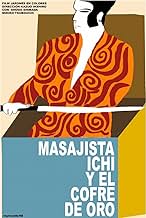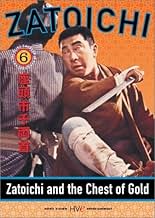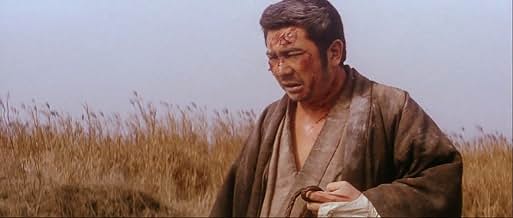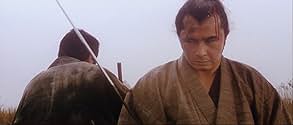IMDb-BEWERTUNG
7,3/10
1951
IHRE BEWERTUNG
Füge eine Handlung in deiner Sprache hinzuZatoichi is mistaken for a thief. To clear his name he must find and defeat the real villain.Zatoichi is mistaken for a thief. To clear his name he must find and defeat the real villain.Zatoichi is mistaken for a thief. To clear his name he must find and defeat the real villain.
- Regie
- Drehbuch
- Hauptbesetzung
Tomisaburô Wakayama
- Jûshirô
- (as Jo Kenzaburo)
Kenjirô Uemura
- Gundayu Matsui
- (Nicht genannt)
Empfohlene Bewertungen
This film sure started off well. Instead of the usual credits, these were the coolest ones yet. Against a black background, Zatôichi smokes a cigarette as periodically evil men attack him and he dispatches them like flies--and continues smoking like he's the toughest guy in town!
When the film itself begins, Zatôichi comes upon a humble village where they are having a celebration. It seems that after three years of drought, the villagers had a good harvest and can finally pay off the tax bill. However, when the money is stolen, the villagers stupidly believe the stranger in town (Zatôichi) did it. Considering that he's blind and doesn't leave after the theft, it sure seems ridiculous to blame him. Further, after the townsfolk beat him up, it's also very surprising that our hero would agree to help them find their stolen funds.
Zatôichi assumes boss Chuji is behind the theft and makes his way towards his village. On the way, he meets a beautiful but mysterious lady. He doesn't seem to think much of this meeting, but oddly you later see this lady begging the local bosses to have Zatôichi killed. But why?!
When Zatôichi finally meets up with Chuji, his assumption is proved wrong, though it IS true that some of his men were involved in the theft. Zatôichi swears to continue following the trail to the money AND also now agrees to transport a little boy for Chuji to another town. Oh, that Ichi--always helping others and not thinking one bit about himself!
A bit later, most of Chuji's men are killed and he barely escapes. It seems that Monji (another boss) is NOT Chuji's friend after all and he's in league with Jushiro. At this point, if you are feeling a bit confused, don't worry. Though you may not be able to determine who exactly is who, just rest assured that Zatôichi will be administering a well-earned butt kicking!!
Overall, this is a very good addition to the series. While it lacks some of the heart and back story of the best films in the series, the plot was engaging and different. Well worth seeing.
When the film itself begins, Zatôichi comes upon a humble village where they are having a celebration. It seems that after three years of drought, the villagers had a good harvest and can finally pay off the tax bill. However, when the money is stolen, the villagers stupidly believe the stranger in town (Zatôichi) did it. Considering that he's blind and doesn't leave after the theft, it sure seems ridiculous to blame him. Further, after the townsfolk beat him up, it's also very surprising that our hero would agree to help them find their stolen funds.
Zatôichi assumes boss Chuji is behind the theft and makes his way towards his village. On the way, he meets a beautiful but mysterious lady. He doesn't seem to think much of this meeting, but oddly you later see this lady begging the local bosses to have Zatôichi killed. But why?!
When Zatôichi finally meets up with Chuji, his assumption is proved wrong, though it IS true that some of his men were involved in the theft. Zatôichi swears to continue following the trail to the money AND also now agrees to transport a little boy for Chuji to another town. Oh, that Ichi--always helping others and not thinking one bit about himself!
A bit later, most of Chuji's men are killed and he barely escapes. It seems that Monji (another boss) is NOT Chuji's friend after all and he's in league with Jushiro. At this point, if you are feeling a bit confused, don't worry. Though you may not be able to determine who exactly is who, just rest assured that Zatôichi will be administering a well-earned butt kicking!!
Overall, this is a very good addition to the series. While it lacks some of the heart and back story of the best films in the series, the plot was engaging and different. Well worth seeing.
10inframan
I think this stunning film ranks among the great action films of all time but could be hung as stills in any art museum. Hokusai & Hiroshige influences abound.
Yet best of all is the unforgettable character Zatoichi himself. Shintaro Katsu created an everyman/superhero who had no equal, at least in western culture. A squat, homely, bandy-legged self-deprecating blind man full of humor & humility & an abundance of spirituality. And could he make that sword dance.
These movies have no equal. Each one is as perfectly made as any movie can be. I used to go see them when they first appeared in the theaters of San Francisco & Los Angeles Japanese neighborhoods. I still love them every bit as much now.
Yet best of all is the unforgettable character Zatoichi himself. Shintaro Katsu created an everyman/superhero who had no equal, at least in western culture. A squat, homely, bandy-legged self-deprecating blind man full of humor & humility & an abundance of spirituality. And could he make that sword dance.
These movies have no equal. Each one is as perfectly made as any movie can be. I used to go see them when they first appeared in the theaters of San Francisco & Los Angeles Japanese neighborhoods. I still love them every bit as much now.
I had low expectations for this film but have to say it was a pleasant surprise. The story had humor, visually it was very interesting, and at times beautiful. The lead actor is very good and I'd like to see more of his work.
Zatoichi and the Chest of Gold is one of the most entertaining entries in the franchise and on the same level as the strong predecessor Zatoichi on the Road. The movie starts with Zatoichi paying respects at the grave of a man he wrongfully killed two years ago. He meets some local villagers who are celebrating the fact that they are finally able to pay their tax debts to the local intendant. However, the chest with the money from eighteen different villagers gets stolen by some ruthless ronin. Since Zatoichi was seen near the scene of the crime, he gets accused of a crime he didn't commit and swears to find the real culprit in order to clear his name. Zatoichi starts his investigation by meeting a bandit who has found refuge on a mountain after he was chased away by political opponents. Zatoichi finds out that some of the bandit's men went rogue but realizes the bandit himself is innocent. They team up in order to clear their names, fight the local intendant and his associates who are behind the theft and conspiracy and help the upset villagers.
There are several reasons why this film stands out. First of all, it has a quite fast pace and doesn't waste any time with a lengthy introduction or an overlong conclusion. No scene is unnecessary and no minute is wasted in this dynamic film. Secondly, the movie has a sociocritical component as it portrays how abusive politicians are only interested in their own objectives while poor villagers are constantly tricked and tortured. Thirdly, the movie includes some straightforward humor for the first time in the franchise. In one scene, Zatoichi surprises a beautiful woman in a hot spring and then coincidentally discovers two young perverted men who were peeping through a window in the roof. In another scene, an ugly prostitute offers her services to Zatoichi who remains polite aside of commenting that the woman smells like a field of pumpkin flowers until he realizes that the prostitute demands a hefty sum for a massage which leads him to suggest her she should take a bath from time to time.
In the end, Zatoichi and the Chest of Gold is an entertaining, fast-paced and refreshingly vivid entry in the franchise and you won't see the film's eighty-three astonishing minutes pass. Aside of the refreshing new elements, the fight sequences are great to watch as usual and especially the final duel between the blind masseur and a man on horseback using a whip is quite memorable. Fans of martial arts films can't get around this energetic film that has aged rather well without losing its connection to rural Japan in the mid-nineteenth century.
There are several reasons why this film stands out. First of all, it has a quite fast pace and doesn't waste any time with a lengthy introduction or an overlong conclusion. No scene is unnecessary and no minute is wasted in this dynamic film. Secondly, the movie has a sociocritical component as it portrays how abusive politicians are only interested in their own objectives while poor villagers are constantly tricked and tortured. Thirdly, the movie includes some straightforward humor for the first time in the franchise. In one scene, Zatoichi surprises a beautiful woman in a hot spring and then coincidentally discovers two young perverted men who were peeping through a window in the roof. In another scene, an ugly prostitute offers her services to Zatoichi who remains polite aside of commenting that the woman smells like a field of pumpkin flowers until he realizes that the prostitute demands a hefty sum for a massage which leads him to suggest her she should take a bath from time to time.
In the end, Zatoichi and the Chest of Gold is an entertaining, fast-paced and refreshingly vivid entry in the franchise and you won't see the film's eighty-three astonishing minutes pass. Aside of the refreshing new elements, the fight sequences are great to watch as usual and especially the final duel between the blind masseur and a man on horseback using a whip is quite memorable. Fans of martial arts films can't get around this energetic film that has aged rather well without losing its connection to rural Japan in the mid-nineteenth century.
The following review is an extract from the book "Shintaro Katsu´s Zatoichi: Complete guide to all movies", which is now available on Amazon.
"This is the sixth part of a saga of films shot in the 1960s about the adventures of the blind swordsman Zatoichi. Always motivated by deep convictions and a strong sense of honour, on this occasion Ichi must shed light on the robbery committed against humble peasants in order to prove that he had nothing to do with the crime. Two intriguing women, the clever Ogin and the young Chiyo (sister of the warrior who killed Zatoichi the previous year) will try to prevent the blind masseur from fulfilling his laudable purpose.
(...) In "The chest of gold" we have the rare privilege of seeing in the same film the two masters of the chanbara genre: On the one hand Shintaro Katsu as the heroic Zatoichi and on the other his brother Tomisaburo Wakayama (Ogami Itto en Kozure Okami / "Lone Wolf and Cub") as his antagonist the evil ronin Joshiro. Just as in "Zatoichi's Pilgrimage" (also directed by Kazuo Ikehiro) his opponent Tohachi (Isao Yamagata) has as particularity his skill with kyudo (archery), here Joshiro stands out in the use of another weapon or combative technique: the whip."
"This is the sixth part of a saga of films shot in the 1960s about the adventures of the blind swordsman Zatoichi. Always motivated by deep convictions and a strong sense of honour, on this occasion Ichi must shed light on the robbery committed against humble peasants in order to prove that he had nothing to do with the crime. Two intriguing women, the clever Ogin and the young Chiyo (sister of the warrior who killed Zatoichi the previous year) will try to prevent the blind masseur from fulfilling his laudable purpose.
(...) In "The chest of gold" we have the rare privilege of seeing in the same film the two masters of the chanbara genre: On the one hand Shintaro Katsu as the heroic Zatoichi and on the other his brother Tomisaburo Wakayama (Ogami Itto en Kozure Okami / "Lone Wolf and Cub") as his antagonist the evil ronin Joshiro. Just as in "Zatoichi's Pilgrimage" (also directed by Kazuo Ikehiro) his opponent Tohachi (Isao Yamagata) has as particularity his skill with kyudo (archery), here Joshiro stands out in the use of another weapon or combative technique: the whip."
Wusstest du schon
- WissenswertesJushiro is played by Shintarô Katsu's real-life brother, Tomisaburô Wakayama, who would later star in the Lone Wolf and Cub series of films (produced by Katsu).
- VerbindungenFeatured in Best in Action: 1964 (2020)
Top-Auswahl
Melde dich zum Bewerten an und greife auf die Watchlist für personalisierte Empfehlungen zu.
- How long is Zatoichi and the Chest of Gold?Powered by Alexa
Details
- Erscheinungsdatum
- Herkunftsland
- Sprache
- Auch bekannt als
- Zatoichi and the Chest of Gold
- Produktionsfirma
- Weitere beteiligte Unternehmen bei IMDbPro anzeigen
- Laufzeit
- 1 Std. 23 Min.(83 min)
- Seitenverhältnis
- 2.35 : 1
Zu dieser Seite beitragen
Bearbeitung vorschlagen oder fehlenden Inhalt hinzufügen
































